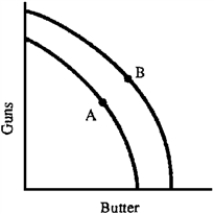Exam 3: The Fundamental Economic Problem Scarcity and Choice
Exam 1: What Is Economics229 Questions
Exam 2: The Economy Myth and Reality154 Questions
Exam 3: The Fundamental Economic Problem Scarcity and Choice254 Questions
Exam 4: Supply and Demand an Initial Look287 Questions
Exam 5: Consumer Choice Individual and Market Demand190 Questions
Exam 6: Demand and Elasticity210 Questions
Exam 7: Production Inputs and Cost Building Blocks for Supply Analysis206 Questions
Exam 8: Output Price and Profit the Importance of Marginal Analysis188 Questions
Exam 9: Securities Business Finance and the Economy the Tail That Wags the Dog201 Questions
Exam 10: The Firm and the Industry Under Perfect Competition194 Questions
Exam 11: Monopoly206 Questions
Exam 12: Between Competition and Monopoly228 Questions
Exam 13: Limiting Market Power Regulation and Antitrust144 Questions
Exam 14: The Case for Free Markets the Price System224 Questions
Exam 15: The Shortcomings of Free Markets207 Questions
Exam 16: Externalities the Environment and Natural Resources216 Questions
Exam 17: Taxation and Resource Allocation219 Questions
Exam 18: Pricing the Factors of Production231 Questions
Exam 19: Labor and Entrepreneurship the Human Inputs267 Questions
Exam 20: Poverty Inequality and Discrimination169 Questions
Exam 21: Is Us Economic Leadership Threatened75 Questions
Exam 22: International Trade and Comparative Advantage221 Questions
Select questions type
Which of the following is likely to affect the position and shape of society's production possibilities frontier?
(Multiple Choice)
4.9/5  (30)
(30)
Which of the following does not determine the position and shape of a society's PPF?
(Multiple Choice)
4.8/5  (46)
(46)
The principle of comparative advantage explains specialization and trade among countries but not among individuals.
(True/False)
4.8/5  (39)
(39)
According to Baumol and Blinder, recognition of the usefulness of markets
(Multiple Choice)
4.8/5  (34)
(34)
Efficient production can be carried out anywhere on or below the production possibilities frontier.
(True/False)
4.7/5  (43)
(43)
What is Jim's opportunity cost of operating his own business?
(Multiple Choice)
4.8/5  (36)
(36)
A ticket to an Eric Clapton concert costs $45.If you have a ticket, you can "scalp" it (sell it illegally) for $75.To a ticket holder, the opportunity cost of actually attending the concert is
(Multiple Choice)
4.9/5  (42)
(42)
The principle of comparative advantage helps explain trade between nations.
(True/False)
4.8/5  (38)
(38)
Economics examines the options open to households, business firms, governments, and entire societies by the limited resources at their command.
(True/False)
4.9/5  (32)
(32)
Figure 3-3  -In Figure 3-3, a shift from A to B seems most consistent with which of the following?
-In Figure 3-3, a shift from A to B seems most consistent with which of the following?
(Multiple Choice)
4.9/5  (43)
(43)
Centrally planned economies are not constrained by the problem of scarcity.
(True/False)
4.8/5  (41)
(41)
In a properly functioning economy, money costs approximate opportunity costs.
(True/False)
4.8/5  (36)
(36)
Why might the money price for something be higher than the opportunity cost? Why might it be lower? Give an example of each to illustrate your answer.
(Essay)
4.9/5  (33)
(33)
Showing 181 - 200 of 254
Filters
- Essay(0)
- Multiple Choice(0)
- Short Answer(0)
- True False(0)
- Matching(0)